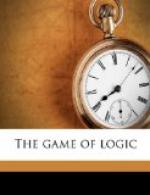Crooked answers.
“I answered him,
as I thought good,
’As many as red-herrings grow in
the wood’.”
__________
1. Elementary.
1. Whatever can be “attributed to”, that is “said to belong to”, a Thing, is called an ‘Attribute’. For example, “baked”, which can (frequently) be attributed to “Buns”, and “beautiful”, which can (seldom) be attributed to “Babies”.
2. When they are the Names of two Things (for example, “these Pigs are fat Animals"), or of two Attributes (for example, “pink is light red").
3. When one is the Name of a Thing, and the other the Name of an Attribute (for example, “these Pigs are pink"), since a Thing cannot actually be an Attribute.
4. That the Substantive shall be supposed to be repeated at the end of the sentence (for example, “these Pigs are pink (Pigs)").
5. A ‘Proposition’ is a sentence stating that some, or none, or all, of the Things belonging to a certain class, called the ‘Subject’, are also Things belonging to a certain other class, called the ‘Predicate’. For example, “some new Cakes are not nice”, that is (written in full) “some new Cakes are not nice Cakes”; where the class “new Cakes” is the Subject, and the class “not-nice Cakes” is the Predicate.
6. A Proposition, stating that some of the Things belonging to its Subject are so-and-so, is called ‘Particular’. For example, “some new Cakes are nice”, “some new Cakes are not nice.”
A Proposition, stating that none of the Things belonging to its Subject, or that all of them, are so-and-so, is called ‘Universal’. For example, “no new Cakes are nice”, “all new Cakes are not nice”.
7. The Things in each compartment possess two Attributes, whose symbols will be found written on two of the edges of that compartment.
8. “One or more.”
9. As a name of the class of Things to which the whole Diagram is assigned.
10. A Proposition containing two statements. For example, “some new Cakes are nice and some are not-nice.”
11. When the whole class, thus divided, is “exhausted” among the sets into which it is divided, there being no member of it which does not belong to some one of them. For example, the class “new Cakes” is “exhaustively” divided into “nice” and “not-nice” since every new Cake must be one or the other.
12. When a man cannot make up his mind which of two parties he will join, he is said to be “sitting on the fence”—not being able to decide on which side he will jump down.
13. “Some x are y” and “no x are y’”.
14. A Proposition, whose Subject is a single Thing, is called ‘Individual’. For example, “I am happy”, “John is not at home”. These are Universal Propositions, being the same as “all the I’s that exist are happy”, “All the Johns, that I am now considering, are not at home”.




